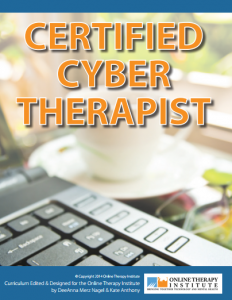 Most clinicians have experienced the vibration or ring of a cell phone during session. Depending upon whether we are “digital immigrants”, “digital natives” or those who would like to seek “digital asylum” our responses might be very different (Prensky, 2001). Many clients are technologically connected in ways that counselors may not have traditionally experienced in the clinical setting. Most addiction counselors pride themselves on “meeting clients where they are,” yet many find it difficult to embrace our client’s connectedness or attachment to their devices. Untangling the mystery and fear of technology for “digital immigrants” doesn’t have to be scary; the clinician need only be willing and open to working within the digital culture using websites and smartphone applications to enhance recovery.
Most clinicians have experienced the vibration or ring of a cell phone during session. Depending upon whether we are “digital immigrants”, “digital natives” or those who would like to seek “digital asylum” our responses might be very different (Prensky, 2001). Many clients are technologically connected in ways that counselors may not have traditionally experienced in the clinical setting. Most addiction counselors pride themselves on “meeting clients where they are,” yet many find it difficult to embrace our client’s connectedness or attachment to their devices. Untangling the mystery and fear of technology for “digital immigrants” doesn’t have to be scary; the clinician need only be willing and open to working within the digital culture using websites and smartphone applications to enhance recovery.
First Choice Services Inc. and its sister corporation First Choice Health Systems Inc. have embraced technology for many years using the original modality of providing telehealth – the telephone. Its two phone-based programs, the West Virginia Prescription Drug Abuse Solutions program and Problem Gamblers Help Network of West Virginia (PGHNWV) program, provide information and referral services across West Virginia, with PGHNWV having provided therapeutic interventions for more than 11,000 problem gamblers and their loved ones since 2000. Additionally, both programs provide a “Chat” option on their websites to engage those who are seeking help and who are more comfortable utilizing computers or mobile devices.
In 2012, First Choice Services, Inc. was awarded a Technology Assisted Care (TAC) grant from SAMHSA to further incorporate technology into treatment services in West Virginia, and as a result developed the Appalachian Technology Assisted Recovery Innovations (ATARI) program. The ATARI program’s objectives include: introducing technology into treatment and recovery support programs in West Virginia; maintaining and increasing client engagement; preventing relapse and developing community partnerships. To help achieve its objectives, ATARI contracted with the University of Wisconsin to utilize the A-CHESS (Addiction-Center for Health Enhancement System Studies) smartphone application, which has been nationally recognized and showcased in the Journal of American Medical Association Psychiatry, TIME magazine, WebMD and Yahoo News.
A-CHESS is comprised of many features to help those in recovery and is currently being vetted as an evidence-based practice. A-CHESS is theoretically based in Self Determination Theory (SDT), which focuses on how social and cultural factors facilitate or undermine people’s sense of volition and initiative, in addition to their well-being and the quality of their performance (Deci & Ryan, 1985). Conditions supporting the individual’s experience of autonomy, competence and relatedness are argued to be the most volitional and therefore, high quality forms of motivation and engagement (Deci & Ryan, 1985).
When clients receive the A-CHESS app, they are encouraged to create a “profile” similar to the profile feature of Facebook. The profile allows clients to share common interests that they might not know about one another. The additional features of the app allow the client to connect to recovering peers and their clinicians through the team feed, support team, messaging, and discussion boards. The messaging function is used as a private email which allows clients to contact each other, their recovery coach, and/or their counselor. The discussion board is used to engage clients in ongoing discussions about recovery topics which can be started by clients or the coach/therapist. Clients have access to recovery podcasts, recovery news, events, and recovery information which help keep them in touch with more self-directed resources.
One of the most innovative features of the app is the “panic button” which allows the client to make contact with one person or many people if they are in a risky situation or at risk of relapsing. At the touch of a button the client can choose to call or text their support team, email their therapist, or engage in various recovery based interventions through the app. They can choose to listen to podcasts that focus on assertiveness cues, relaxation techniques, dealing with urges, and refusal skills. This provides a 2-3 minute “time out” to the distressed client who may need to ride out the temporary emotional state.
The A-CHESS has an administrative function where the clinician can mass message clients, add sober events to the clients’ calendar, monitor participation, and evaluate client progress and concerns on the app. Data available to the clinician include individual and group Brief Alcohol Monitoring (BAM) survey responses. The client is prompted weekly to complete the BAM survey which assesses not only relapse triggers, but evaluates protective factors as well. If the client’s BAM responses are indicative of clinical decline the treating therapist is alerted by the ACHESS system which allows for prompt intervention to occur.
The treating clinician is also provided with information regarding client’s use of specific features on the app, as well as, the amount of time the client is engaged with the technology. This data can be utilized in treatment planning and developing client specific interventions. This easy to read clinical data compliments quality practice and assists in providing measurable outcomes required by the Affordable Care Act. Clinicians are given the tools needed to provide a continuum of care for each client participating in the A-CHESS program.
As a next step, First Choice Services Inc. through the ATARI program partnered with sixteen organizations around West Virginia to provide access to smartphones with unlimited talk, text and data for six months, including comprehensive behavioral health centers, smaller behavioral health centers, and private practices. The phones are pre-programed with the A-CHESS app along with several recovery-based apps that were vetted and chosen by staff, including Sober Day, 12 Steps, NA Speakers, and Room to Breathe. The additional apps were chosen to help compliment and add to the tools available with A-CHESS. While A-CHESS is more focused on recovery from alcoholism, clients may use these other apps to access to resources related to recovery from narcotic use etc.
Client engagement is a very strong indicator of success in treatment and relapse prevention. A-CHESS allows for engagement with staff, both clinical and non-clinical, as well as peers who are in the same treatment groups. The Affordable Care Act is going to change how many treatment providers deliver service to clients and A-CHESS is a great example of a safe, secure, closed recovery environment which is very affordable at less than $2.00 per week per client. If clients are engaged with their clinician and peers, it seems a very good investment and would likely lead to better outcomes.
The ATARI program administers a “first day survey” through a custom A-CHESS survey option to collect information about access and impact of technology prior to joining the program. In looking at data from ATARI’s first six months and comparing to data obtained in these “first day surveys,” clients are reporting a 21.6% increase in abstinence, a 9% decrease in depression, a 24% decrease in anxiety, and a decline of intravenous drug use from 7% to zero. “A little over half of ATARI participants had no online recovery help before this program,” says Carmen Combs, evaluator at First Choice Services Inc. and First Choice Health System Inc., “Now 87% of the clients who responded to the survey stated they feel connected with their recovery support using A-CHESS.” This means recovery help is making an impact.
In the spirit of Motivational Interviewing, adopting new technology during these times of extreme changes in the field has presented challenges. Clinicians and staff enter partnership with ATARI at varying stages of fears, concerns, and excitement. The setting and role of the clinician made a difference in the willingness to embark on integration of the smart phone and apps. Many of the more traditional clinicians were extremely concerned about HIPAA and boundaries. However, recovery coaches, peer specialists, and staff at day report centers were eager to embrace technology and were excited to have the additional resources made available by A-CHESS, and saw the ability to provide a reliable form of communication with clients via the smart phone as a tremendous resource. In order to allay fears of HIPAA breaches, clients were provided an extensive informed consent, required to set a unique password on the phone, and given the option to select a user name which could be fictional.
For additional accountability, the ATARI staff participated in bi-weekly calls with 50 other TAC grantees across the nation to share program successes and problem solve obstacles as they arose. Additionally, we worked closely with JBS International and participated in onsite reviews of the ATARI program.
In March 2014, the ATARI staff participated in a technology showcase at the SAMHSA headquarters where we were able to meet with Dr. H. Wesley Clark and the TAC grantees for a two day healthcare and technology conference. This provided a platform to not only evaluate the current Healthcare Technology Programs, but to begin to develop sustainability objectives and look toward future projects.
As a result of these successes. ATARI has begun to develop a secure online platform for the delivery of one-on-one counseling services in order to further facilitate the integration of technology in West Virginia. There are many platforms available and a very comprehensive list can be found at www.behavioralhealthinnovation.com. In addition ATARI selected approximately 25 Master’s level licensed social workers, licensed professional counselors, psychologists, and Advanced Alcohol and Drug Counselors from West Virginia and provided the face-to-face two-day training for the National Board of Certified Counselors’ Distance Credentialed Counselor (DCC), a national credential recognizing a professional with training in the best practices in distance counseling.
Some states are beginning to require additional coursework, continuing education or credentialing before clinicians provide “distance counseling.” West Virginia licensing boards do not require additional formal education, however, the newly released American Counseling Association Code of Ethics indicate under section “H.1.a Knowledge and Competency- Counselors who engage in the use of distance counseling, technology, and/or social media develop knowledge and skills regarding related technical, ethical and legal considerations (e.g. special certifications, additional course work)” (American Counseling Association, 2014). Additionally, counselors and agencies need to seek clarification from malpractice insurance carriers about whether distance counseling is covered under their policy, and usually provide information about the platform security and assurance that the service delivery method falls within the counselors’ competencies and scope of practice. Additional resource organizations which provide training and certifications include the Online Therapy Institute and the Telemental Health Institute and the National Frontier and Rural Addiction Technology Transfer Center (NFARATTC), which solely focuses on addiction treatment and technology, instead of “telemedicine” and “telepsychiatry”. These allied professions have certainly forged the path for all behavioral health professionals; however, many of the resources fall short in addressing the needs of licensed counselors. NFARATTC, International Institute for Mental Health Online, Online Therapy Institute and the TeleMental Health Institute provide more specific resources for what is considered substance abuse and mental health. The Regional Technology Resource Centers are also a tremendous resource and similar to the ATTC Network, most states have a regional center and they are happy to assist.
As “digital immigrants” being able to conceptualize technology based counseling was initially difficult. However, this project has allowed us to see how this additional layer of support has enhanced the client’s treatment experience and improved client engagement. Health care reform, governmental policy, and reimbursement sources are all trending toward technology enhanced treatment. However, we have been most powerful impacted by receiving thankful messages like “I’m not sure where I would be without this program” and “this program has helped save my life quite a few times just by having instant access to my fellow addicts and counselor.” This is an exciting new time.
This article first appeared in the Summer 2014 issue of TILT Magazine ~ Therapeutic Innovations in Light of Technology.
Click here to read the entire PDF version of the “Tech Support”- Using Technology to Support Ongoing Recovery article.
REFERENCES
American Counseling Association (2014). ACA Code of Ethics. Alexandria, VA: Author
Chih, M., Patton, T., McTavish, F., Isham, A., Judkins-Fisher, C. L., Atwood, A. K., & Gustafson, D. H. (2014). Predictive modeling of addiction lapses in a mobile health application. Journal of Substance Abuse Treatment, 46(1), 29-35. PMCID: PMC3963148
Deci, E. L., & Ryan, R. M. (1985). Intrinsic motivation and self-determination in human behavior. New York: Plenum.
Gustafson, D. H., McTavish, F. M., Chih, M. Y., Atwood, A. K., Johnson, R. A., Boyle, M. G., Levy, M. S., Driscoll, H., Chisholm, S. M., Dillenburg, L., Isham, A., & Shah, D. (2014). A smartphone application to support recovery from alcoholism: A randomized controlled trial. JAMA Psychiatry. 2014 Mar 26. [Epub ahead of print] doi:10.1001/jamapsychiatry.2013.4642. NIHMSID: NIHMS550949
Gustafson, D. H., Boyle, M. G., Shaw, B. R., Isham, A., McTavish, F., Richards, S., Schubert, C., Levy, M., & Johnson, K. (2011). An e-Health solution for people with alcohol problems. Alcohol Research & Health, 33(4), 327-337. PMCID: PMC3536059
McTavish, F. M., Chih, M. Y., Shah, D., & Gustafson, D. H. (2012). How patients recovering from alcoholism use a smartphone intervention. Journal of Dual Diagnosis, 8(4), 294-304. PMCID: PMC3541672
Prensky, M. (2001). Digital Natives, Digital Immigrants. On the Horizon, 9(5):1-6.
Substance Abuse and Mental Health Services Administration. (2011). Leading Change: A Plan for SAMHSA’s Roles and Actions 2011-2014. HHS Publication No. (SMA) 11-4629. Rockville, MD: Substance Abuse and Mental Health Services Administration. Retrieved at: http://store.samhsa.gov/shin/content/SMA11-4629/08-HealthInformationTechnology.pdf
The International Society http://ismho.org/
Online Therapy Institute https://www.onlinetherapyinstitute.com/
National Frontier & Rural ATTC www.attcnetwork.org/regcenters/index_nfa_frontierrural.asp
Telemental Health Institute http://telehealth.org/
Telehealth Resource Center www.telehealthresourcecenter.org
American Counseling Association Code of Ethics 2014 http://www.counseling.org/resources/aca-code-of-ethics.pdf
Susie Mullens MS, LPC, ALPS, AADC-S, Licensed Psychologist, SAP, DCC (Distance Credentialed Counselor) is the program director for the ATARI project at First Choice Services in Charleston, W.V. She is the immediate past president of WVAADC and serves on the NAADAC Veterans Subcommittee. Prior to ATARI, she was the Director of Counseling & Wellness at Davis & Elkins College in Elkins, WV. Ms. Mullens has been working in the mental health & substance use disorders field for over 23 years.
Teresa Warner is the ATARI Program Coordinator for First Choice Services, Inc. She has over 20 years working with substance dependent and the dual diagnosed clients, providing direct service in the community behavioral health centers, serving as a case manager in outpatient and residential settings, and as a probation officer for the West Virginia Supreme Court. In 2011, Ms. Warner began working for the West Virginia Physicians Health Program which provides intervention and supervision of medical professionals struggling with addiction. Under the supervision of Dr. P. Bradley Hall she obtained her Medical Review Officer Assistant Certification.
More about ATARI project: http://1stchs.com/atari-appalachian-technology-assisted-recovery-innovations.html
““Tech Support” Using Technology to Support Ongoing Recovery first appeared in the July 2014 issue of Advances in Addiction & Recovery. © 2014 NAADAC, the Association for Addiction Professionals. All
Access TILT Magazine archives: http://issuu.com/onlinetherapyinstitute/docs


